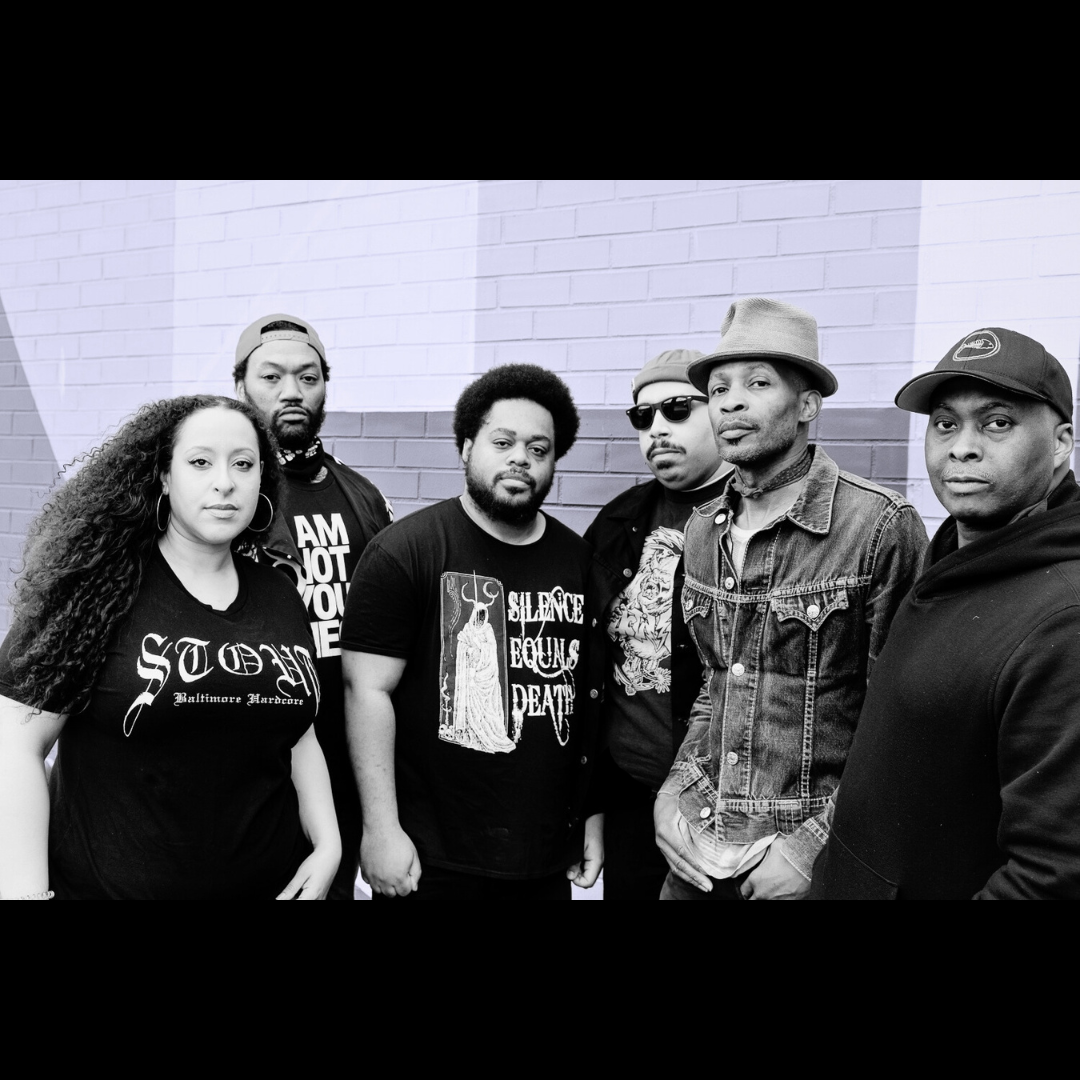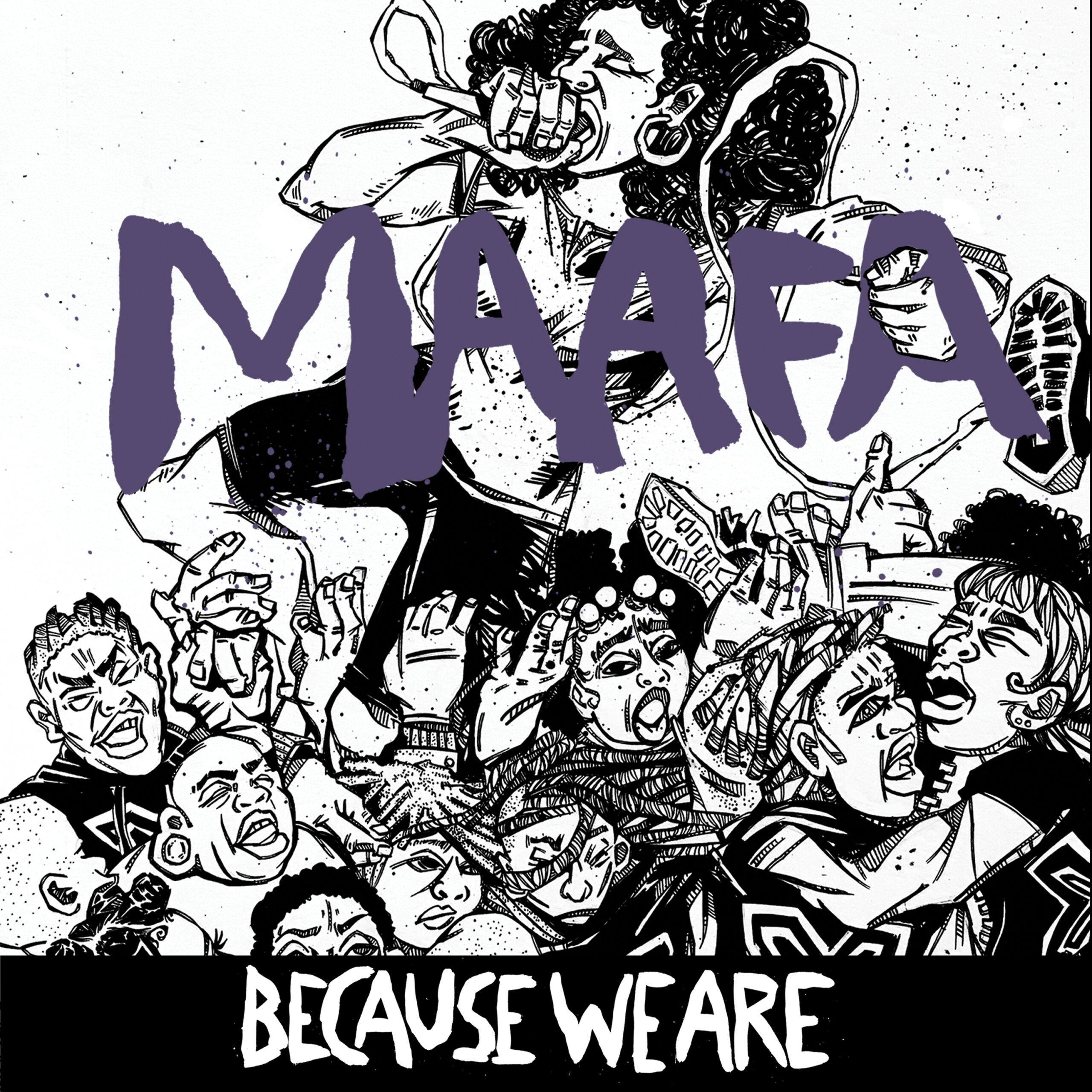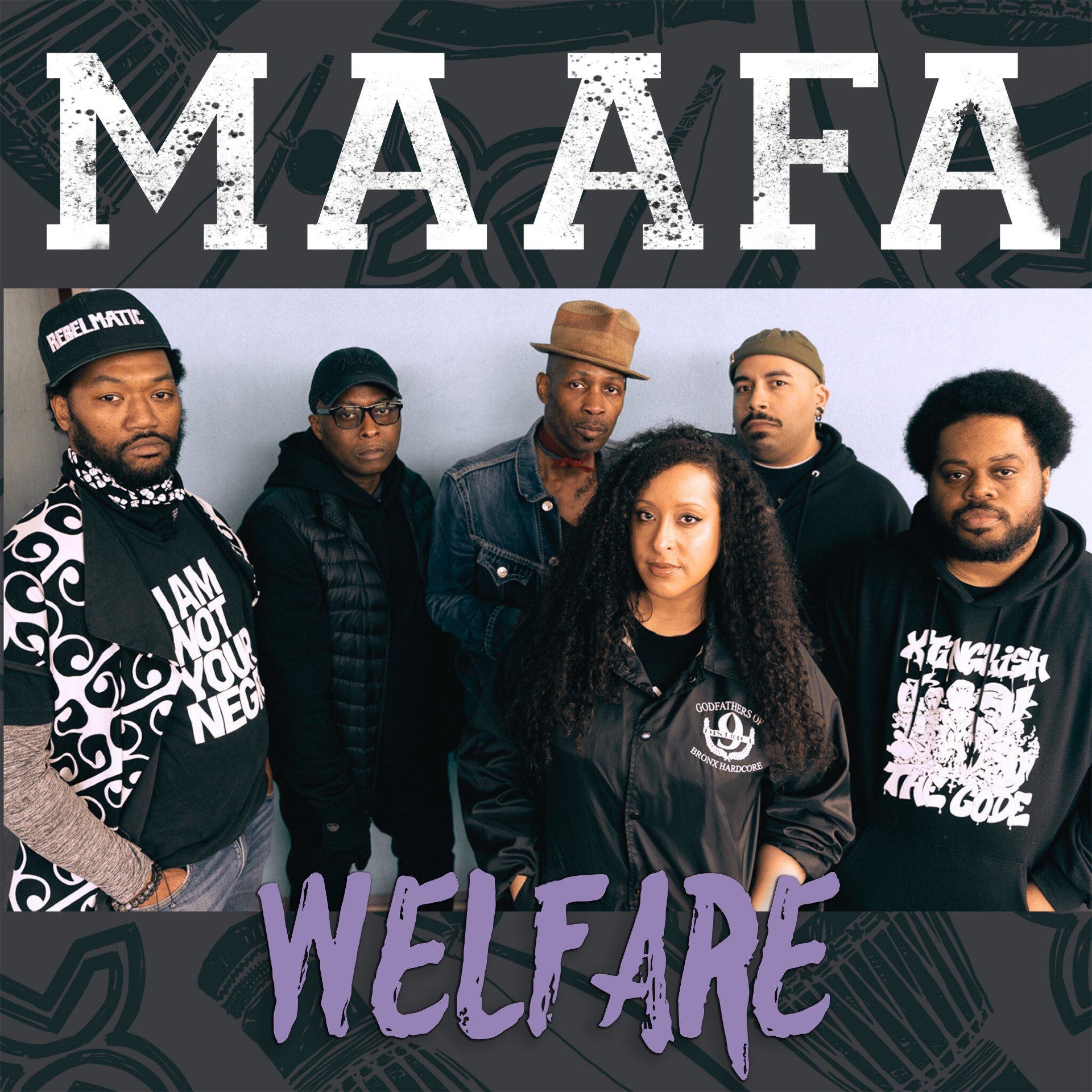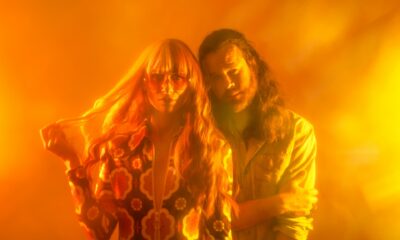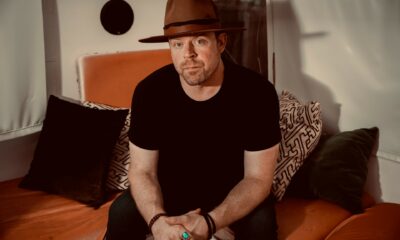Hardcore/Punk
MAAFA Frontwoman Flora Lucini Talks Growing Up in DC, Beatdown, and Bif Naked
Following their recently-released debut full-length album, ‘Because We Are’ (Fuzz Therapy Records ), MAAFA frontwoman Flora Lucini chats with us about growing Up in DC, beatdown, and Bif Naked.

When I sit down with MAAFA frontwoman Flora Lucini, I’m expecting to speak with someone seething with anger. As the force behind one of the fastest-growing hardcore punk bands today, noted for her activism in her local scenes and beyond, Flora has been guiding the band from success to success as of late.
Earlier this year, MAAFA released their debut full-length album, Because We Are, which has been making waves for the band. No small part of that is thanks to the unique vision of Flora, the group’s founder, composer, vocalist, and lyricist.
One of the reasons for that is the subject matter of the lyrics and the band’s approach. Flora dubbed the unique blend of African instrumentation with hardcore punk “Afro-Progressive Hardcore.” The band uses the Swahili word for ‘catastrophe,’ which has come to refer to the Middle Passage for its namesake. These are signposts of a band with no intention of pulling their punches, musically or politically.
In a scene infamous for its reactionary politics, progressive ideals, and staunch resistance, I’m expecting to meet with someone who is jaded, cynical, and irreverent. It’s the go-to character trait people inherit upon entry to the scene.
Instead, I’m met with one of the most positive, upbeat people I’ve ever had the pleasure of knowing. It flies in the face of my expectations and reminds me that we all have the capacity for something greater. We have the capacity to make music and tell stories of a world that is not what we face every day. For us, art is a vestige of survival – it is the ability to dream.
Speaking with Flora Lucini is akin to rediscovering the parts of yourself you liked best. She burns bright with an effusive charm that’s disarming. During the course of our conversation, we covered what feels like countless topics. We discuss her being born and raised in Rio de Janeiro in Brazil, moving to Washington, DC, in 1991, and eventually finding her way to her current alma mater, Berklee College of Music. Along the way, I made more than a few surprising revelations, as well as sincere insight that I can’t help but find myself mulling over even now.
What follows is an abridged version of our conversation about MAAFA and then some.
Family, resistance, and music
“I’m Flora. I was born in Brazil, in Rio, and I came to the United States in 1991, to Washington, DC, and I grew up there.”
“Both my parents and I are professional jazz musicians; gigging, session touring, recording, all that stuff. And so are my uncles and my aunts, also professional artists. They’re all musicians – so a big musical family. My family’s also very… it’s very interesting.
“Democracy in Brazil is, I think, a year or two younger than me.”
“My family and I are both equal parts music and equal parts like science and math and politics and organizing. So I come from a very long line of either like, political organizers, engineers, mathematicians, architects and scholars, or a very long line of musicians and composers and band leaders.
“My house was always the place for people to meet and hang out. And then also for political organizing. Even before I was born in Brazil my grandparents and my parents always had local politicians and artists that were involved in a lot of music that had to do with activism at that time. You know, cuz we were still under the dictatorship in Brazil. So democracy in Brazil is, I think, like a year or two younger than me.
“My parents all went to historically black colleges and universities.”
Life after moving to Washington, DC:
“I mean the ’90s was just the best time ever. I’m sorry, it was just the best for me. I just love everything about my childhood in terms of the culture: Hole, Courtney Love, No Doubt.
“Then eventually, of course, I found Bif Naked, who is like, just everything to me. But those were… they informed me about my singer-songwriter stuff. Like I do a lot of that kind of music too on my own, and I got into rock and heavy rock.
“And my parents, my dad used to be a skater. He listened to Pink Floyd back in the day. You know in hindsight, my dad was one of the first black skaters. Nobody would ever know cuz it was like the sixties in Brazil, you know what I mean? It’s just wild when I think about it… I have a great picture of him, on this halfpipe, getting some air. When I first saw it I was like, ‘Yeah man!’
“My mom got me into Rita Lee, who just passed away recently. She was from Brazil…like Tropicalia music. She got me into Suzi Quatro, David Bowie. So I grew up with all of that, plus every single form of black musical tradition you could think of.”
Discovering heavy music:
“I’m very grateful for what I had, despite poverty, despite immigration issues, despite being in a new country with a new language, not knowing English very well, all that stuff. I was very quick to learn my surroundings and embrace my environment. And I had a lot of beautiful things that my parents gave me that I didn’t even know were abnormal or not common until much later in life.
“And it was around that time that I started getting into heavy rock and metal and pop-punk and whatever was on the radio. And the more aggressive the music got that I was listening to, the more I wanted it to be more aggressive. Cause it was something that I was searching for, this feeling – I was searching for that. It was like this eternal quest for heavy. That’s been my life, you know, for aggressiveness; not stupid, but in a good, healthy way, you know?…
“The first time I heard ‘Pretty On The Inside’ I was around nine years old, and I was like, ‘Yeah! Whatever that is!’ At first, I hated it cuz I was scared. I was little and I was like, ‘Ah! What is that?’ But I had already kind of eased into it because I had already listened to No Doubt, and Ramones, all that other stuff. But when I first heard ‘Pretty On The Inside,’ a woman with a voice like that, I was like, for the rest of my life I’m sold.”
Getting into punk:
“But it wasn’t really until I got into like sixth or seventh grade when I started getting into punk. My dad took me to my first punk show.
“By the time I was 14 years old, I had already joined my first punk band. I’d already started going to hardcore shows. I was going to all-ages hardcore matinees at American University by 14; by 15, I started booking hardcore shows.
“So my first memory of going to what I would consider a legitimate, authentic punk experience? The fall of 1998, I would say, ’98 or ’99. Somewhere there, because by 2000 I was going to hardcore shows. 2001 I was hanging out, going to hardcore shows, going to more aggressive types of hardcore, cause there was a lot of youth crew. It was the only all-ages event.
“Our heroes are tangible to us in hardcore. That’s one of the greatest gifts that this community gives you, and sets it apart from any other subculture.”
“Beatdown came into my life maybe two years later, and I got hooked, but it was not the kind of beatdown that people consider beatdown hardcore to be today. Like, Billy Club Sandwich, Scheduled Beating, 36 Crazyfists, Stout, Mickey’s Crew – those were the shows I was going to at the time.”
Being authentic:
“I’m just happy to be here. That’s just my essence of human. I can meet the same famous person every day for the rest of my life, and I’ll always be like, ‘Oh my God, thank you so much. I love you.’ Just because that’s just who I am.
“People have picked on me for that all of my life. They still do. People give me shit for that. Even today people think it’s weird or awkward. Or people will discredit the value I have because I treat others that way because of how they see me.
“You decided your response is to be an asshole to the world because that’s how you protect yourself. My response was to be the love for others that I didn’t get.”
“They’re projecting their crap on me. I don’t care. For me, when I see a celebrity or a famous person – well, by hardcore punk standards – your fame isn’t what makes me go, ‘Ahhh!,’ you know? It’s that I see you, and I’m brought back to being seven years old, listening to your record for the first time and how much that changed my life.
“Or the fact that you wrote this one lyric that no one talks about, and it’s the most important thing that sticks with me. Whatever that is, I want you to feel that as an artist cuz I’m an artist, and I know that that’s all we live for. We live for knowing that one person’s life was affected by anything that was in our hearts.
“That we had the courage to be vulnerable enough to share with you and that you appreciate it. And I’m a big believer in giving credit and giving flowers to people right now, right now, right now. And not just a one-time event.
“Our heroes are tangible to us in hardcore. That’s one of the greatest gifts that this community gives you, and sets it apart from any other subculture.”
On empathy:
“I just care about people, even people who hate me.
“That makes me wanna show you, because what you’re communicating to me is that somewhere along the line someone told you what they’ve been telling me. We just both chose to go about it differently. Somebody told you that you’re not enough. Somebody told you that the way you love is fucked up.
“Somebody told you that something’s wrong with you. Somebody didn’t show you what you needed when you needed it. And so you decided your response to that is to be an asshole to the world because that’s how you protect yourself. My response was to be the love for others that I didn’t get.
“And so we’re really pretty much the same person. So when you hurt my feelings, and you do something bad, it makes me wanna go like, ‘Are you okay, baby? Let’s talk.’ Not like, fuck you. It makes me want… like, I want you to just come here and tell me what’s wrong, like, ‘What happened? Who hurt you? And let’s go beat them up right now.’”
You can find MAAFA’s Because We Are streaming on all available platforms, and you can catch them at Upstage Fest this August supporting the likes of Sick Of It All.
-

 Music1 week ago
Music1 week agoTake That (w/ Olly Murs) Kick Off Four-Night Leeds Stint with Hit-Laden Spectacular [Photos]
-

 Alternative/Rock2 days ago
Alternative/Rock2 days agoThe V13 Fix #011 w/ Microwave, Full Of Hell, Cold Years and more
-

 Alternative/Rock1 week ago
Alternative/Rock1 week agoThe V13 Fix #010 w/ High on Fire, NOFX, My Dying Bride and more
-

 Features1 week ago
Features1 week agoTour Diary: Gen & The Degenerates Party Their Way Across America
-

 Culture2 weeks ago
Culture2 weeks agoDan Carter & George Miller Chat Foodinati Live, Heavy Metal Charities and Pre-Gig Meals
-

 Music1 week ago
Music1 week agoReclusive Producer Stumbleine Premieres Beat-Driven New Single “Cinderhaze”
-

 Indie2 days ago
Indie2 days agoDeadset Premiere Music Video for Addiction-Inspired “Heavy Eyes” Single
-

 Alternative/Rock2 weeks ago
Alternative/Rock2 weeks agoThree Lefts and a Right Premiere Their Guitar-Driven Single “Lovulator”

